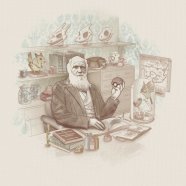
Pokemon darwin charles darwin 1280x1280 wallpaper – Anime Pokemon
Scientists at the beginning of the 1800s know of some kinds of fossils, and they were very aware of homologous and vestigial structures. Many scientists suspected that some kind of evolution had given rise to living things around them. However, they had no unifying theory to explain how evolution might have occurred. Two scientists led the way in the search for a mechanism of evolution. The first was Jean Lamarck. The second was one of the greatest figures in biology, Charles Darwin.
Evolutionary Theory Before Darwin The first systematic presentation of evolution was put forth by the French scientist Jean Baptiste de Lamarck (1774-1829) in 1809. Lamarck described a mechanism by which he believed evolution could occur. This mechanism was known as "the inheritance of acquired characteristics."
Assume that there were salamanders living in some grasslands. Suppose, Lamarck argued, that these salamanders had a hard time walking because their short legs couldn't trample the tall grasses or reach the ground. Suppose that these salamanders began to slither on their bellies to move from place to place. Because they didn't use their legs, the leg muscles wasted away from disuse and the legs thus became small. Lamarck's theory said that the salamanders passed this acquired trait to their offspring. In time the salamander's legs were used so rarely that they disappeared. Thus, Lamarck argued, legless salamanders evolved from salamanders by inheriting the acquired characteristic of having no legs. Lamarck presented no experimental evidence or observation and his theory fell out of scientific favor. The next significant idea came from the British scientist Charles Darwin.
Darwin's Background
Charles Darwin (1809-1882), like many people of genius, did not at first appear to have extraordinary talents. From a young age Darwin disliked school and preferred observing birds and collecting insects to study. He was sent to medical school in Scotland when he was 16. Young Darwin found medicine "intolerably dull." He was much more interested in attending natural history lectures. Seeing that Darwin lacked enthusiasm for becoming a doctor, his father suggested he study for the clergy. Darwin was agreeable to the idea and enrolled in the university at Cambridge, England, in 1827. Here again, Darwin admitted, "My time was wasted, as far as the academic studies were concerned." However, Darwin found that his friendship with John S. Henslow, professor of botany, made life in Cambridge extremely worthwhile. Through long talks with Henslow, Darwin's knowledge of the natural world increased. Henslow encouraged Darwin in his studies of natural history. In 1831 Henslow recommended that Darwin be chosen for the position of naturalist on the ship the HMS Beagle.
Source: bioweb.cs.earlham.edu
Oh, boy, names!
by DarziMine may not be the most unique, but they all have background.
Cash - little black dog, my 'Man in Black,' so he's named after Johnny Cash.
Francisco - orange tabby cat, named after a not-so-well known literary character, Francisco D'Anconia from 'Atlas Shrugged' by Ayn Rand.
Midna - black and silver tabby, named after the shadow character from 'Legend of Zelda: Twilight Princess.'
Darwin - crotchety old sable ferret, named after Charles Darwin.
Jack - spunky, dark sable ferret, named after Captain Calico Jack Rackham.
Annie - deaf, marked white panda ferret, named after Anne Bonny and arrived with Cap'n Jack
Another perspective on Pope's life
by cree
"The greatest crime of his papacy, however, was neither his part in this cover up nor his neanderthal attitude to women. It was the grotesque irony by which the Vatican condemned - as a "culture of death" - condoms, which might have saved countless Catholics in the developing world from an agonising Aids death. The Pope goes to his eternal reward with those deaths on his hands. He was one of the greatest disasters for the Christian church since Charles Darwin. "
Gives a good rundown on why Pope was selected and his background.
An agnostic at worst. A theist at best.
by stogie5Charles Darwin's views on religion have been the subject of much interest. His work was pivotal in the development of evolution theory.
Charles Darwin had a non-conformist background, but attended a Church of England school. He studied Anglican theology with the aim of becoming a clergyman, before joining the Voyage of the Beagle. On return, he developed his theory of natural selection in full awareness that it conflicted with the teleological argument. Darwin deliberated about the Christian meaning of mortality and came to think that the religious instinct had evolved with society
Retiring at 82: You've got to like your work — ABC Local
She's spent the last 20 years working as a lecturer in horticulture at Charles Darwin University. "You've to like your work," says Mrs Hagan when asked why she kept working long after she could have put her feet up. "I like the students, the students ..
Uni ratings' big tick — The Australian Financial Review
.. the University of Wollongong, Macquarie University, University of Technology Sydney, the University of South Australia, Deakin University, Murdoch University, Charles Darwin University, Curtin University of Technology, Flinders University, Griffith ..

|
Race, Evolution, and Behavior: a Life History Prspective, 2nd, Second Special Abridged Edition
Book (Charles Darwin Research Institute)
|
Sugar glider moves around the family tree — ABC Online
Thought for more than 150 years to be a subspecies of sugar glider, researchers based at Charles Darwin University in Darwin have recently found it more closely resembles two other species of glider, and they speculate that it may even represent an ..







